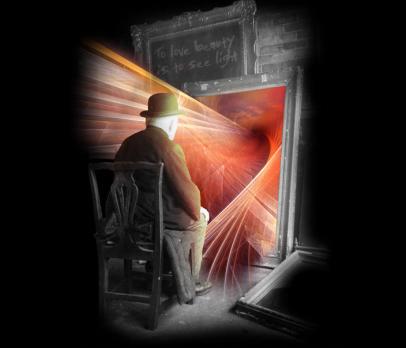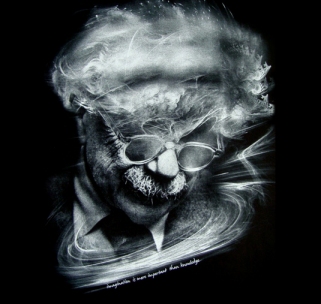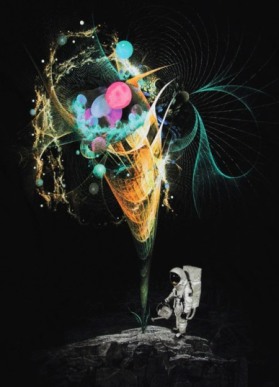Tags
.
How do we define ‘knowledge’ in a postindustrial society equipped with new media, instantaneous communication technologies and universal access to information? Who controls its transmission? How can scientific knowledge be legitimated?
The nature of knowledge itself is shifting from being an end in itself to a commodity meant to be repackaged and redistributed. In order to be valuable, learning must be able to be reformatted into these packets of information in computer language, so that they can be sent through that channel of communication. Today, we increasingly hear the words “knowledge economy” and “information society” to describe the era we are entering. As was always the case, knowledge is power. Now, in an increasingly complex world, those with the ability to sort through the vast amounts of information and repackage it to give it meaning will be the winners. Technologies continue to solve problems that were formerly the source of power struggles between nations (i.e. the need for cheap labor is diminished by the mechanization of industry, the need for raw materials is reduced by advances in alternative energy solutions), and so control of information is most likely to become the 21st century’s definition of power.
.
2. The Problem: Legitimation
.
The definition of knowledge is determined by intertwining forces of power, authority, and government. Leotard draws a parallel between the process of legitimation in politics and of those in science: both require an authority figure or “legislator” to determine whether a statement is acceptable to enter the round of discourse for consideration. In an increasingly transparent society, this leads to new questions:
Who is authorizing the authority figure? Who is watching the watchers?
.
4. The Nature of the Social Bond: The Modern Alternative
.
Lyotard says that to understand the nature of knowledge in modern times, one must be able to understand how the society operates. In this case, postmodern society it is either a whole, or split in two. Is it an optimistic model that views society as a cohesive, unified whole, or a model based in dissonance, where the needs of the people and functions of the system are incompatible? Either way, society is a machine, and knowledge is a cog in the system that keeps it running.
.
5. The Nature of the Social Bond: The Postmodern Perspective
.
The social bond is itself a language game, each of us nodes on a communication net, intercepting and resending messages throughout the system. These messages affect the nodes in the language game, causing “moves,” “displacements,” and “countermoves,” all which potentially enhance and enrich the system by creating innovation and novelty. This method of communication differs greatly from the modern institutional approach at language games, which limit the kinds of ‘moves’ able to be made by creating rigid boundaries and rules.
.
7. The Pragmatics of Scientific Knowledge
.
Scientific knowledge is characterized by the ability to provide proof supporting a statement, and ability to refute opposing statements. The combination of these two conditions do not prove a statement ‘true,’ but rather as being likely to be true based on our understanding of reality. The competence needed in the formulation of scientific knowledge does not require a social bond; it is one-sided, only requiring a sender’s competence, and is composed only of the language game of the denotative utterance.
In postmodern society, we have two types of knowledge: narrative and scientific. Neither can be judged as right or true or better in comparison to the other, because their criterion of competence is difference.
.
8. The Narrative Function and the Legitimation of Knowledge
.
Narrative knowledge is looked at disdainfully by advocates of scientific knowledge because it doesn’t put legitimation as its foremost priority when forming statements. Ironically, scientific knowledge must resort to narratives in order to legitimate itself, as arguments and proofs are merely dialectics. The new function of narrative knowledge is characterized by both denotative utterances concerning truth, and prescriptive utterances concerning justice. “The people” decide that what is needed to determine the legitimacy of truth or justice is simply their debate and consensus.
.
9. Narratives of the Legitimation of Knowledge
.
The two predominant versions of the narrative of legitimation. The first is “humanity as the hero of liberty.” Humanity becomes the validator of knowledge: laws that are created are just because the citizens who create them desire them to be just, and so it follows that they must be just. Knowledge is valuable insofar as it serves to meet the goals of the collective. The second positions science as a path to morality, ethical action, and spirituality. Legitimation then becomes the subject of the philosophical, of the spirit.
.
11. Research and Its Legitimation through Performativity
.
New methods of argumentation and establishing proof are changing the pragmatics of research. It is accepted that there are a variety of methods to arguing truth, not just a universal metalanguage. New moves, new rules, and new games are all pathways of progress in scientific knowledge. Proof is increasingly established through technology, because the technical apparatus can make observations more efficiently than human senses. The problem is that technology costs money, and so truth can most often only be established by the wealthy. This interweaving of efficiency and wealth has meant that research is typically conducted not to establish truth, but to turn a profit and gain power. If those with wealth are running the game, they continue establishing proof by funding more research, which then increases efficiency or ‘performance improvement,’ which allows more ‘proof’ to be produced, which as an end in itself becomes a type of legitimation. So in the postmodern world, power is the knowledge of how to increase the efficiency of the system, which is accomplished by having, creating, and reformatting the most information and data.
.
12. Education and Its Legitimation through Performativity
.
What defines learning and education when knowledge becomes the equivalent of performativity of the social system? Education ceases to end with young people at the university level – instead members of society will need to continually absorb new information in order to be able to function in an ever-evolving system. The role of professor as transmitter of learning may decrease, as computer-based learning opportunities increase. When information becomes universally accessible and ubiquitous, learning becomes a matter of knowing how to harvest the information out of a vast pool of data, how to ‘create’ knowledge by reassembling available information in meaningful ways.
.
14. Legitimation by Paralogy
.
Postmodern thought accepts that there cannot be a fixed, static paradigm for legitimation in a system that is fluid, organic, and constantly in flux in its process of growth. It is more apparent now that at any other previous point in history that we are living in a world of accelerating technological change, and flexibility of the players to create new moves and rules will be crucial to society’s functioning. Permanence has always been an illusion, and aligning our interactions and interpretations of society and knowledge more with the notion of transience and ephemerality will only service in our favor.
—-
update: lynne desilva johnson: “it can be a useful exercise to remove philosophical texts from their heritage and create new ownership of concepts and language, reapplying these concepts heuristically out of context to new and different times and places. While the author wishes some accuracy in terms of the general translation of this model, she is less concerned with the original application/ontological trappings and as such the following essay should read as her extrapolated contemporary reading of this theorist as applies to this time and place”
(from the archives; 19 march 2009; media studies graduate paper)
imagery from the Imaginary Foundation






Heavy stuff…so far I like how Joe Firestone applies Karl Popper’s philosophy of fallibility on knowledge.
Rather than justified true belief, he says that we have many knowledge claims and we throw critical thinking at all of them, and those claims that survive our critical thinking-those that are not eliminated along the way-are the current best knowledge claims we have at hand for a context.
“Since justification and certain proof is not attainable, the obligation to find a method that will produce certainty does not exist, and the obligation to pursue certainty ourselves without such a method is also gone. What remains is the problem of selecting among our tentative solutions, “our guesses” according to a method that is open to us. This method is error elimination through criticism of competing ideas and beliefs in light of various critical perspectives (fallible ideas themselves) we develop and use”
“…that knowledge needs neither to be justified nor to be true, but only needs to survive our best efforts at criticism, testing, and evaluation […] we test competing knowledge claims”
Awesome article – worth reading several times! I love this site! Everything that I have intuitively known the past few years is described with clarity here! I wrote a simplified layperson’s version two years ago that might be of interest. After reading this article today, I decided to repost it @: http://www.noomizo.com/index.php/the-information-multiplication-generation/
There are two immediate problems here — though of course it’s fun to see some old-school philosophy here (you know I have a personal affinity) — but since this is, as it were, “what I do,” I went right into that mode… and red lights went off.
*Especially* when the line is crossed again into the use and reference of philosophical texts from the canon, our onus grows in terms of being crystal clear in our translation, application, deviation from, interpretation of etc. Most of these texts are deeply embedded in linguistic patterns and circles that make immediate reference to and draw from other texts within a dense tradition of theory — that is to say, these are ontologies that carry baggage.
As you know, I am a big cheerleader of using and applying these texts broadly into daily and contemporary life, making them both more legible in their own intentions as well as in our shifted use of them for our own sphere, but this move is often a risky one and requires *enormous* responsibility on the part of the user regarding an understanding of the language, context, and intent of the original texts.
On the other hand, if the user has no desire to use the context or give themselves the responsibility above, that is also perfectly legitimate — but the act of that interpreter/writer is then a HUGELY different one, and in responsible usage should be stated as such:
A disclaimer such as the following might be helpful (and most honest):
“it can be a useful exercise to remove philosophical texts from their heritage and create new ownership of concepts and language, reapplying these concepts heuristically out of context to new and different times and places. While the author wishes some accuracy in terms of the general translation of this model, she is less concerned with the original application/ontological trappings and as such the following essay should read as her extrapolated contemporary reading of this theorist as applies to this time and place….etc”
Without a clear disclaimer like the above, and without it we cannot tell if you are providing a summary of Lyotard’s points or creating a new ontology using him as a jumping off point. If this was an essay that was handed in to me it would be red lined throughout and a warning about plagiarism would follow. And that’s a major issue — ownership of ideas. We’ve spoken quite a lot about how people use and repackage philosophical ideas and create “new” theories from them with little clear reference, therefore I’m surprised to see this boundary being crossed so brashly above 😦 [and I’m aware that this is a somewhat old paper, but you did choose to post it, without a different type of disclaimer, ie: this is a summary I did of Lyotard’s theory for a graduate class, please excuse ____ etc. ]
So here’s the two sticking points:
Firstly, the title doesn’t immediately mention Lyotard. While your original audience anticipated a book review, this audience doesn’t, and can easily skip the first line in which it’s somewhat understood that this is what you’re doing. And the text that follows doesn’t help clarify that point, since there is no clear division in your text in terms of where and when you are providing a summary of Lyotard and where/whether or not you have deviated into an extrapolated understanding of your own (ie, wherein you are drawing parallels that apply *now* and not in the “postmodern” era, as per the model suggested above).
In every instance when you use a quote, by not continuing to reference the author, the text, or he, in the explanation of the concept, you have switched linguistically into ownership of the theory, and a quick read would gauge that these are your ideas and points, inspired by Lyotard. Where he ends and you begin is never explained and not clear in the text itself.
Secondly, “postmodern.” This is a HUGE term! and again – outside of the classroom setting, for which this paper was intended, it is something that must be owned, made clear, and re-contextualized. Most philosophers have been and are struggling with what term to use to follow postmodernism, and would say that while some aspects of postmodern (and postindustrial) continue to apply, that these terms were intended for (and most accurately describe) the condition that occurred as a backlash to Modernism both conceptually and actually.
Basically, you need to make clear if this is a historical essay. Lyotard wrote this in 1979, and his work *is* timebound. To be responsible to Lyotard and let him own his own work it isn’t fair to make a broad sweep that suggests that he would say the same today. If you think that it does, clarify that you are making these suggestions and that he is not. There should always be a clear statement of the date of citation — not stating it openly actually makes what we do as people who use philosophy seem more intentionally manipulative, especially in circles where you cannot assume a primary personal understanding of the material and its history in your readers.
Love you!
xo
so you gonna be an EBD editor soon, or what? 😉
OK – switched title from ‘reflection’ to ‘summary’,
added in first sentence that it is a book review/summary
and put your disclaimer blurb in the footer.
now, call me so we can schedule a day next week to see pina in 3d.
;p
ha — just saw this. YES, I am already an EBD editor, just a….rogue one. I worked a super long shift yesterday and taught the first day of class this am… yay new minds! I love this work.
and yes — pina in 3d! I’ll call you when I get home (in about an hour)
xoxo
Lyotard’s epistemological survey on post modern knowledge is basically to define the ‘knowledge’ and who does control it and how it can be legitimated. to understand it’s core one has to understand mata narrative, para logy, plurality, heterogeneity etc.Lyotard asserts how forces of power, authority and government have a grip on knowledge, and how these authoritarian forces define knowledge.
amitabh ranjan kanu
gauripur, assam, india.
Critical comments accepted for action. Love the whole piece. Cross-posted (extract and link) to Phi Beta Iota the Public Intelligence Blog with the following added note at the top:
NOTE: This is a book review, extraction from the work above, not personal reflections inspired by the book, and is offered as such–a gleaning from Lyotard’s 1979 work.
I find this site to be unique and most useful to my own personal reflections.
I would seriously challenge number 10, the idea that “the grand narrative is dead.” To my mind, nothing could be further from the truth. See here, for example…
WHAT IS THE GREAT STORY?
http://thegreatstory.org/what_is.html
Pingback: Sunday Afternoon Reads: Old Cars and the Future of the Web | Lauren Proctor Internet Marketing
Triggered thoughts about Seely Brown’s (and others’) distinction that knowledge is characteristic of persons and distinct from information. Is there knowledge in cyberspace, or only nested patterns of information that become “knowledge” when interacted with by persons? Although different persons can agree on the pattern of semiotic structures (enabling replication) their experientials may be quite different.
Also triggered thought of The Cybernetic Brain: Sketches of Another Future by Andrew Pickering (also author of The Mangle of Practice). Pickering shifted my perspective from an existential ontology toward a process ontology, where this issue takes on a totally different light. I differ with Pickering in my desiring a complementarity of both existential and process ontologies instead of a shift to process ontology.
Pingback: Narrative Therapy « Paul's Reflections
Both subtle and precise, sophisticated thinking alongside clear expression of thought. Great reading! Most enjoyable.
Pingback: The Supremacy of language, heaven, god, and society « JRFibonacci's blog: partnering with reality
An electronic cigarette store may be just what is needed.
Since I have started using an Electronic Cigarette
I have wanted to shout it from the rooftops. The electronic cigarette is known as a
personal vaporizer, as it produces a fine mist or vapor, similar to the steam from a cup
of hot coffee.
This situation is referred to as gender dysphoria. Male-to-female transgendered people do not feel like they are only half-female or half person.
They control exactly how they present to the world and can make up their lives exactly the way they dream it
should be.
Oh my goodness! Impressive article dude! Thank you, However I am encountering difficulties with your RSS.
I don’t understand why I cannot subscribe to it. Is there anyone else getting identical RSS
problems? Anyone who knows the solution will you kindly respond?
Thanks!!
If you do not have a whole lot of time to spare,
chair massage is the ideal alternative for you. The problem of hair loss has become a worldwide epidemic.
You want to make them feel invited into the store, but you also do not
want to make them feel trapped by an overambitious attempt to up sell them
with other products, or obligate them to future purchases.
Fortunately, birtrhdays and Christmas don’t come unannounced so in the run up to these occasions, bbe curious and find out what’s going on in your
dearest teenage girl’s life. Most first year teachers are surprised by the amount of meetings, staff developments, parent conferences, etc.
Second, it’s not right to take the blame of
the world on your shoulders wjen it’s just your relationshiip to
oppressive power that you just haven’t understood yet –
that is the problem, not you.
My brother recommended I might like this blog. He was totally
right. Thiss post actually made my day. You cann’t imagine jjust how much time I
hhad spent for this information! Thanks!
I’d be interested in. Sharing this post with.the audience at hplusmagazine.com. Contact peter@hplusmagazine.com if you are interested.